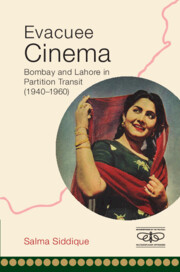Book contents
- Frontmatter
- Dedication
- Contents
- List of Figures
- Acknowledgements
- Introduction: A Moving Picture
- 1 The All-India Ambitions of Lahore
- Part 1 The Secular Stance of Bombay
- Part 2 Between Bombay and Pakistan
- Conclusion: Evacuee Cinema
- Appendix: Three Film Transcripts from the Fazli Family Collection
- Filmography
- Bibliography
- Index
4 - The Partition Wish: Fazli Brothers and the Muslim Social
Published online by Cambridge University Press: 11 October 2022
- Frontmatter
- Dedication
- Contents
- List of Figures
- Acknowledgements
- Introduction: A Moving Picture
- 1 The All-India Ambitions of Lahore
- Part 1 The Secular Stance of Bombay
- Part 2 Between Bombay and Pakistan
- Conclusion: Evacuee Cinema
- Appendix: Three Film Transcripts from the Fazli Family Collection
- Filmography
- Bibliography
- Index
Summary
In 2013, the Pakistani newspaper Express Tribune published a correspondence between Jinnah and a certain Mohammad Masud from Aligarh. Presumably responding to Masud's curiosity in ascertaining Jinnah's opinion of cinema and of film-maker Mehboob Khan, who was then making the historical Humayun, the Muslim League leader wrote that he wished ‘more Musalmans would enter the film industry as there's plenty of scope for them’. While Jinnah expressed a willingness to facilitate such an entry, his enthusiasm for a Muslim-made historical film under production appears to be wanting. This seemingly unremarkable, short letter is truly a signpost of the complexity and ethos of Muslim representation in colonial Indian cinema. On the one hand, it signals a discontent with the state of things such as the existing number of Muslims in the industry as well as the hegemonic genre of historical associated with Muslim film-making; on the other, it identifies a certain scope for the community in Bombay film-making, which coincidentally had links to the reformist, Islamic modernism of the Aligarh Muslim University (AMU) where Masud lived before partition.
This chapter seeks to examine the sudden spurt of the Muslim social film in the Hindustani film industry between the years 1940 and 1947. As this period also spans the unprecedented ascendancy of Muslim nationalism in the Indian subcontinent, bracketed by the Lahore Resolution at one end and the formation of a separate Muslim nation on the other, I examine if the film genre representing the religious and cultural distinctiveness of Indian Muslims was also imprinted with the larger problem of Muslim nationality at this time. Representing contemporary urban Muslim lives in India, the Muslim socials focus on the family and its offshoots and emphasise particularity through language, poetry, clothes and customary practices. I approach this genre by foregrounding the neglected oeuvre of the ‘pioneers of Muslim social subjects in India’, the Fazli Brothers, who migrated to Pakistan after partition. Working exclusively within this category, they were the earliest self-conscious producers of the genre. As most of their films are no longer available, I use three available film transcripts in combination with the one surviving film, newspaper classifieds, film reviews and government records to contextualise the genre historically. Scrutinising other extant Muslim social films of this period for their generic coherence and continuum with the Fazli oeuvre, this chapter delineates a genealogy of the genre.
- Type
- Chapter
- Information
- Evacuee CinemaBombay and Lahore in Partition Transit, 1940–1960, pp. 109 - 143Publisher: Cambridge University PressPrint publication year: 2023



